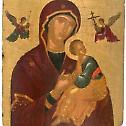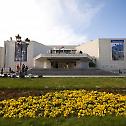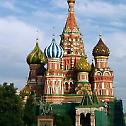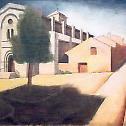Culture
Russian icons discovered in Egypt
5. August 2011 - 11:16![]() Researchers attribute the unique climate of Egypt’s Sinai Peninsula as a leading factor in the preservation of a treasure trove of Russian icons and liturgical objects recently found in St Catherine’s Monastery. The discovery of around 100 Russian icons and decorative objects dating from the 16th to 19th century at the Unesco World Heritage Site was reported in Russia last month. Almost all of the works were unknown to scholars, according to Natalia Komashko, a research project manager at Moscow’s Andrei Rublev Museum of Early Russian Art and Culture.
Researchers attribute the unique climate of Egypt’s Sinai Peninsula as a leading factor in the preservation of a treasure trove of Russian icons and liturgical objects recently found in St Catherine’s Monastery. The discovery of around 100 Russian icons and decorative objects dating from the 16th to 19th century at the Unesco World Heritage Site was reported in Russia last month. Almost all of the works were unknown to scholars, according to Natalia Komashko, a research project manager at Moscow’s Andrei Rublev Museum of Early Russian Art and Culture.
St Catherine’s Monastery is famous for its library, which houses one of the world’s largest collections of ancient manuscripts and codices, as well as for its sizable collection of sixth-century icons that survived the wave of Byzantine iconoclasm that destroyed most at that time.
Collection of icons of Sekulic opened for public
4. August 2011 - 15:55One of the museums within the Museums of the City of Belgrade, the Sekulic collection of icons, which is located in Uzun Mirkov 5, for the first time is opened for public. The collection of icons Sekulic can be seen every Tuesday and Saturday from 10 to 16, the ticket price is 100 dinars, and for special categories is only 50 dinars.
In the house of Pave and Milan Sekulic, which these passionate collectors, along with the collection of icons, paintings and works of applied art, gave as a gift to the city of Belgrade in 1970 in authentic interior there is the biggest collection of icons in Serbia.
150 years of Serbian National Theatre in Novi Sad
29. July 2011 - 14:49Our oldest professional theatre, the Serbian National Theatre in Novi Sad, (then within Austria - and from 1867 Austro-Hungary) was founded on yesterday's date one and a half century ago and with the mission to awake national consciousness and to strengthen cultural identity. In the turbulent history many things happened and it survived hard days and glorious moments. Visit of the theatre group of Jovan Knezevic in 1860 encouraged Jovan Knezevic in 1860 to to write many texts in Novi Sad's "Serbian diary" on need to found the Serbian National Theatre.
Exhibition dedicated to Byzantium
28. July 2011 - 13:12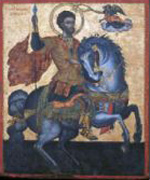 With a reduced budget but no cuts in terms of the quality of its scientific and artistic program, the European Cultural Center of Delphi is preparing to open its doors once again to host its annual international symposium. This year, the symposium will focus on the before and after of the Byzantium period.
With a reduced budget but no cuts in terms of the quality of its scientific and artistic program, the European Cultural Center of Delphi is preparing to open its doors once again to host its annual international symposium. This year, the symposium will focus on the before and after of the Byzantium period.
The core of the symposium’s parallel events is the exhibition “Worship and Shrines after the Fall of Constantinople from the Benaki Museum Collections,” which will be inaugurated by Ecumenical Patriarch Vartholomaios on June 28.
Reform of liturgical language in Russia
28. July 2011 - 13:04The Russian Orthodox Church is preparing for a reform of its liturgical language, and a draft document on the role of Church Slavonic in modern church life has been circulated among dioceses and is available for discussion on the internet.
"Church Slavonic is a very important means to keep unity and traditions inside the Church. But on the other hand, understanding of liturgical texts written in Church Slavonic may be simplified," a senior Church official, Archimandrite Kirill, said on Monday.
Paintings of Milan Konjevic in Gallery of SASA
27. July 2011 - 12:10A retrospective exhibition of famous painter of Milan Konjović Sombor (1898-1993), titled "The creative work of a century", will be officially opened tomorrow at 19 am in the Gallery of the Serbian Academy of Sciencies and Arts (SASA), Belgrade. The audience will be able, while walking Knez Mihailova street, to see it until 27th September 65 Konjovic's paintings and 20 pastels , as part of the artist's extensive opus, which includes around 6000 works (oils, pastels, watercolors, tempera, drawings, tapestries, stained glass, mosaics, graphics, set design, costume sketches).
Source: Politika

